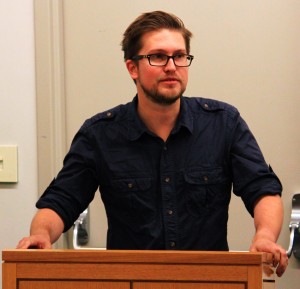
C. Cain Elliott ’06 delivered a lecture, “Nationalism as a Theological Problem,” on Wednesday night in the ARH on how St. Paul approaches nationalism.
Elliott, who has been studying and teaching in Poland for the past six years, is on track to obtain his Ph.D. from the Polish Academy of Sciences. The departments of Religious Studies and Russian, Central, and Eastern European Studies co-sponsored his visit, which was made possible by Grinnell’s Alumni Scholar’s Program. The program allowed Grinnell alums who have nearly completed their graduate degrees to revisit the campus, give a presentation, reacquaint themselves with faculty and meet with students. Elliot’s talk reflected an interdisciplinary nature common at the College.
“You can’t have a discussion about nationalism in the West without acknowledging the role of theology in it,” Elliott said.
Elliott’s lecture explored the work of religious historian Jacob Taubes and Christian theologian Erik Peterson, who have only recently been seriously looked at by scholars (Peterson was translated into English only as late as 2011). For Elliott, how the two interpret Paul and his approach to the problems presented by nationalism is of special interest. Elliott points out that Paul was searching for a solution to the problem of nationalism that went beyond the two alternatives: the biological/ethnical model presented by Jewish monotheism and the universalist model represented by Rome.
Whereas Taubes says that the solution must occur within Judaism, Peterson argues that there is a movement from the synagogue to the church, but both agree that Paul is denying the legitimization of theocratic governments through God.
Tyler Roberts, Religious Studies, commented on Cain’s work by explaining its historical significance.
“We tend to think of ourselves as secular,” Roberts said. “[We think] that Christianity and Judaism were important 400 years ago, but that they’ve become less important, and I think the kind of work Cain is doing is suggesting that even if that’s true in a some respects … [it] makes it clear that religious traditions are still at work in the way we think, even if we don’t consider ourselves … religious at all.”
Following the lecture was a Q&A session, where faculty like Roberts and Alan Schrift, Philosophy, as well as students, inquired about the lecture, Elliott’s studies and life.
“For me, this project is entirely to do with the fact that my whole life, the experience of my family … is this tip-toeing dance across Judaism and Christianity, so that’s a complete point of fascination for me,” said Elliott in response to a question about his motives.
As to what advice he has for Grinnell students, Elliott said, “Don’t get down-trodden thinking about what you’ll do with a liberal arts education … if you can think critically, express yourself, and use argumentation, you’ll be well off.”




















































Paul • Sep 10, 2012 at 10:05 pm
Like Jesus, Paul was interested in moving beyond nationalism. Paul was deeply Jewish, yet moved Judaism in a new direction, as did Jesus. This new direction was much more pluralistic in the sense that Paul looked beyond Judaism as an ethnic designation. Faith became the issue that transcended ethnicity. In regard to religious systems still being at work in our thinking, that will likely always be true. A good question is why? Where does this religious impulse come from and what perpetuates it?